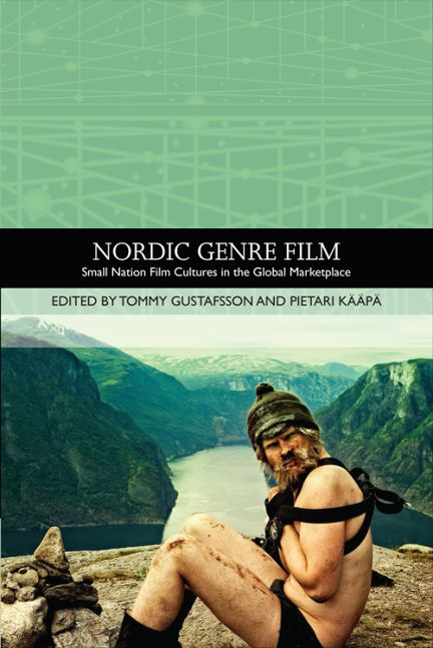Book contents
- Frontmatter
- Contents
- List of Illustrations
- List of Contributors
- Traditions in World Cinema
- Introduction: Nordic Genre Film and Institutional History
- PART I HERITAGE CINEMA AND NATIONAL NARRATIVES
- PART II CRIME AND DETECTIVE NARRATIVES
- PART III NORDIC OPTIMISM: ROAD MOVIES, COMEDIES AND MUSICALS
- PART IV NORDIC HORRORS
- PART V GENRE BENDERS
- 15 A National/Transnational Genre: Pornography in Transition
- 16 Going Hollywood: Nordic Directors in American Cinema
- 17 A Culture of Reciprocity: The Politics of Cultural Exchange in Contemporary Nordic Genre Film
- Index
17 - A Culture of Reciprocity: The Politics of Cultural Exchange in Contemporary Nordic Genre Film
from PART V - GENRE BENDERS
Published online by Cambridge University Press: 25 October 2017
- Frontmatter
- Contents
- List of Illustrations
- List of Contributors
- Traditions in World Cinema
- Introduction: Nordic Genre Film and Institutional History
- PART I HERITAGE CINEMA AND NATIONAL NARRATIVES
- PART II CRIME AND DETECTIVE NARRATIVES
- PART III NORDIC OPTIMISM: ROAD MOVIES, COMEDIES AND MUSICALS
- PART IV NORDIC HORRORS
- PART V GENRE BENDERS
- 15 A National/Transnational Genre: Pornography in Transition
- 16 Going Hollywood: Nordic Directors in American Cinema
- 17 A Culture of Reciprocity: The Politics of Cultural Exchange in Contemporary Nordic Genre Film
- Index
Summary
Right now, the region is one of the most robust places for cool films and since we've been supporting genre film from the region, we've built a great relationship with Norwegian Film Institute. Traditionally, they've dealt with more high-minded films, but they've definitely seen the potential in genre film in the last few years.
Tim League in Calore (2012)Tim League, the founder of Austin's Alamo Drafthouse Cinema chain, and a key figure in distributing genre cinema in the US, outlines several significant developments in the international profile of Nordic film culture. His comments touch on the context where a range of genre films like Iron Sky (Vuorensola, 2012), Død snø/Dead Snow (Wirkola, 2008), The Reykjavik Whale Watching Massacre (Kemp, 2010) and Kommandør Treholt og Ninja troppen/Norwegian Ninja (Malling, 2010) have broken the perception of a bleak sense of Nordic miserabilism of the Bergman or the Kaurismaki variety. Instead, cinemas of the Nordic countries are now ‘cool’ and receive blessing from both high-minded arts institutions and geeky fans alike. Furthermore, it seems genre has a substantial role to play here with both producers and creative institutions from the Nordic countries embracing its commercial and creative potential. In addition, League's comments were published in Wired magazine, a venue for tech-savvy media connoisseurs, which reports on the very latest in the intersection of technology and communications. The combination of genre and new media culture clearly provides Nordic film producers with a novel take on infiltrating what is, in reality, still very much a global niche market.
From where do the inspiration and incentives for such productions emanate? How does the often quirky genre-related content of these films fit in with the parameters of national cinema culture in the Nordic context? The quirkiness prevalent in the above productions is not entirely surprising, as Nordic film productions have a history of featuring odd comic behaviour including works by well-known auteurs such as Lars von Trier, Aki Kaurismaki, Nicolas Winding Refn and Bent Hamer.
- Type
- Chapter
- Information
- Nordic Genre FilmSmall Nation Film Cultures in the Global Marketplace, pp. 244 - 261Publisher: Edinburgh University PressPrint publication year: 2015



